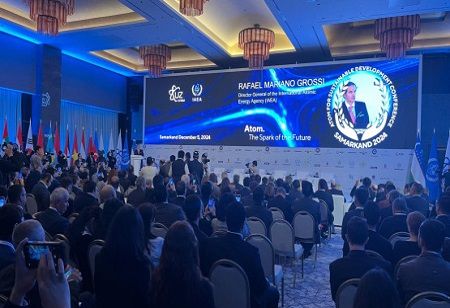President Shavkat Mirziyoyev delivered a statement following a recent meeting which underlined increasing cooperation with the International Atomic Energy Agency (IAEA). According to the signed agreement, the parties will cooperate for the strengthening of national institutions, further training of specialists, as well as promoting initiatives in the fields of nuclear power, agriculture, water, health, and environmental protection.
Uzbekistan is, through its energy strategy, stepping up nuclear power development. First phase of the construction involves the deployment of small modular reactors, with a view to six reactors in six years, each producing 55 MW.
Director General Rafael Mariano Grossi started his inaugural visit to the Central Asian country with meetings with Director Azim Akhmedkhadjaev of the Uzatom Agency which will oversee the project, Energy Minister J. Mirzamakhmudov and nuclear regulator R. Abduvakkos.
Mr Grossi said: “The IAEA stands ready to support Uzbekistan’s ambitious plans to introduce nuclear power, including SMRs. Together, we’ll work on the adoption of a robust legal framework to ensure the highest safety standards”.
On the second day of his visit the Director General spoke at a major conference on the benefits of nuclear energy for the region, organized by Uzbekistan, which highlighted how the IAEA can help countries advance their nuclear power plans in a safe way.
In an address prepared for the conference, President Shavkat Mirziyoyev said: “Our country was one of the first in the world to begin the construction of small nuclear power plants in accordance with international requirements and standards. We consider the IAEA as our major partner in the successful implementation of these projects, as well as a number of healthcare and scientific programs”.
Other speakers included Minister of Energy Mirzamakhmudov, Justin Friedman from the Bureau of International Security and Nonproliferation, U.S. Department of State and Andrey Rozhdestvin CEO of Rosatom Western Europe, as well as Sama Bilbao from the World Nuclear Association. During the conference the Director General also signed an addendum to the country programme framework with Uzatom on support for the introduction of SMRs in the country.
Another key area of IAEA support to Uzbekistan is in the field of healthcare, under the Agency’s Rays of Hope initiative, to improve access to cancer diagnosis and treatment.
The Ministry of Health of Uzbekistan requested IAEA help to train personnel for a new oncology centre, in a project financed by the IsDB with a budget of $ 2.3 million.
During his trip, the Director General visited key sites advancing nuclear science in the country, such as the Institute of Nuclear Physics and the National Research Nuclear University (MEPhI).
He noted: “The Institute of Nuclear Physics and its research reactor have been safely operating for 60 plus years and contributing to medical and industrial radioisotope production. This legacy sets a strong foundation for Uzbekistan’s nuclear power plans”.
Mr Grossi also met with MEPhI students, telling them: “The highest standards of education are the foundation of any successful nuclear power programme. This is one of the world’s most prestigious institutions in the field and shows its constant dedication to excellence. The IAEA will be supporting you all the way”.

